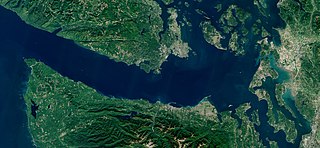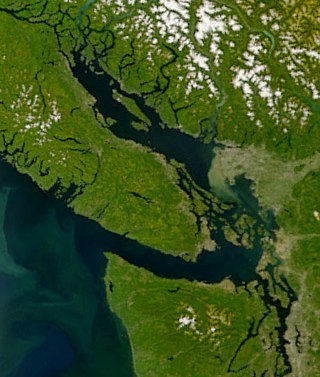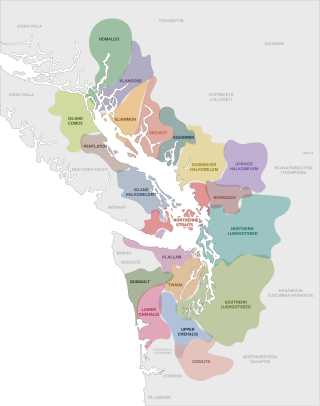
Puget Sound is a complex estuarine system of interconnected marine waterways and basins located on the northwest coast of the U.S. state of Washington. As a part of the Salish Sea, the sound has one major and two minor connections to the Strait of Juan de Fuca, which in turn connects to the open Pacific Ocean. The major connection is Admiralty Inlet; the minor connections are Deception Pass and the Swinomish Channel.

Salmon is the common name for several commercially important species of euryhaline ray-finned fish from the genera Salmo and Oncorhynchus of the family Salmonidae, native to tributaries of the North Atlantic (Salmo) and North Pacific (Oncorhynchus) basins. Other closely related fish in the same family include trout, char, grayling, whitefish, lenok and taimen, all coldwater fish of the subarctic and cooler temperate regions with some sporadic endorheic populations in Central Asia.

The Strait of Juan de Fuca is a body of water about 96 miles long that is the Salish Sea's main outlet to the Pacific Ocean. The international boundary between Canada and the United States runs down the centre of the Strait.

Zither is a class of stringed instruments. The modern instrument has many strings stretched across a thin, flat body.

The term American folk music encompasses numerous music genres, variously known as traditional music, traditional folk music, contemporary folk music, vernacular music, or roots music. Many traditional songs have been sung within the same family or folk group for generations, and sometimes trace back to such origins as the British Isles, Mainland Europe, or Africa. Musician Mike Seeger once famously commented that the definition of American folk music is "...all the music that fits between the cracks."

The Appalachian dulcimer is a fretted string instrument of the zither family, typically with three or four strings, originally played in the Appalachian region of the United States. The body extends the length of the fingerboard, and its fretting is generally diatonic.

The Strait of Georgia or the Georgia Strait is an arm of the Salish Sea between Vancouver Island and the extreme southwestern mainland coast of British Columbia, Canada, and the extreme northwestern mainland coast of Washington, United States. It is approximately 240 kilometres (150 mi) long and varies in width from 20 to 58 kilometres. Along with the Strait of Juan de Fuca and Puget Sound, it is a constituent part of the Salish Sea.
Grays River is a tributary of the Columbia River, approximately 30 miles (48 km) long, in southwestern Washington in the United States. One of the last tributaries of the Columbia on the Washington side, it drains an area of low hills north of the mouth of the river.

Oncorhynchus is a genus of ray-finned fish in the subfamily Salmoninae of the family Salmonidae, native to coldwater tributaries of the North Pacific basin. The genus contains twelve extant species, namely six species of Pacific salmon and six species of Pacific trout, all of which are migratory mid-level predatory fish that display natal homing and semelparity.

The Salish Sea is a marginal sea of the Pacific Ocean located in the Canadian province of British Columbia and the U.S. state of Washington. It includes the Strait of Georgia, the Strait of Juan de Fuca, Puget Sound, and an intricate network of connecting channels and adjoining waterways.
The Squamish people are an indigenous people of the Pacific Northwest Coast. Archaeological evidence shows they have lived in the area for more than a thousand years. In 2012, there was population of 3,893 band members registered with the Squamish Nation. Their language is the Squamish language or Sḵwx̱wúʔmesh snichim, considered a part of the Coast Salish languages, and is categorized as nearly extinct with just 10 fluent speakers as of 2010. The traditional territory is in the area now in southwestern British Columbia, Canada, and covers Point Grey as the southern border. From here, it continues northward to Roberts Creek on the Sunshine Coast, up the Howe Sound. The northern part includes the Squamish, Cheakamus, Elaho and Mamquam rivers. Up the Cheakamus River it includes land past Whistler, British Columbia. The southern and eastern part of their territory includes Indian Arm, along Burrard Inlet, through False Creek then English Bay and Point Grey. Today the Squamish people live mostly in seven communities, located in West Vancouver, North Vancouver, and within and nearby to the District of Squamish.

The Coast Salish peoples are a group of ethnically and linguistically-related Indigenous peoples of the Pacific Northwest Coast, living in the Canadian province of British Columbia and the U.S. states of Washington and Oregon. They speak one of the Coast Salish languages.
Malahat First Nation is a Coast Salish First Nations community of W̱SÁNEĆ representing approximately 350 members with two reserve lands located on the western shore of Saanich Inlet, Vancouver Island in British Columbia, Canada. The Malahat First Nation is one of many nations within the Coastal Salish group that live on their traditional lands. The Coastal Salish are Indigenous to the Northwest mainland, coast, and islands. The Malahat First Nation is a member nation of the Naut'sa mawt Tribal Council and was the ninth First Nation in Canada to be certified by the First Nations Financial Management Board. The ancestral languages of Malahat Nation are Hul̓q̓umín̓um̓ and SENĆOŦEN. The Hul̓q̓umín̓um̓ or Halkomelem language is spoken in Washington State and British Columbia and is within the Coastal Salish language family. Currently it is being revitalized, as it is mainly spoken by elders in the community. The Chief of Malahat Nation is George Harry. George served on the council for four years before being elected as Chief on June 10, 2019.

Coast Salish art is an art unique to the Pacific Northwest Coast among the Coast Salish peoples. Coast Salish are peoples from the Pacific Northwest Coast made up of many different languages and cultural characteristics. Coast Salish territory covers the coast of British Columbia and Washington state. Within traditional Coast Salish art there are two major forms; the flat design and carving, and basketry and weaving. In historical times these were delineated among male and female roles in the community with men made "figurative pieces, such as sculptures and paintings that depicts crest, shamanic beings, and spirits, whereas women produced baskets and textiles, most often decorated with abstract designs."
Susan Point is a Musqueam Coast Salish artist from Canada, who works in the Coast Salish tradition. Her sculpture, prints and public art works include pieces installed at the Vancouver International Airport, the National Museum of the American Indian in Washington D.C., Stanley Park in Vancouver, the Museum of Anthropology at UBC, the Penn Museum in Philadelphia, and the city of Seattle.
Music of the Pacific Northwest encompasses many musical styles from prehistory to the modern Pacific Northwest.
Debra Sparrow, or θəliχʷəlʷət (Thelliawhatlwit), is a Musqueam weaver, artist and knowledge keeper. She is self-taught in Salish design, weaving, and jewellery making.
Margaret Christl is a Scottish-Canadian folksinger. Christl was born in England, grew up in Scotland and West Wales, and emigrated to Canada in 1966. She became active in the folk revival scene, playing many folk festivals, including the Mariposa Folk Festival, Vancouver Folk Music Festival, Edmonton Folk Festival and the Calgary Folk Music Festival, as well as the club and coffeehouse circuit. She worked with different folk labels over the years to release a number of works, most notably The Barley Grain for Me. This album was recorded with Ian Robb and William Laskin in 1976 via Folk-Legacy Records, and was dedicated to Edith Fowke, an influential scholar, folklorist, and collector of folk music in Canada.
Chrystal Sparrow is a traditional and contemporary Musqueam Coast Salish artist living in Vancouver, British Columbia, on unceded Coast Salish territory.

The waters of the Salish Sea, on the west coast of North America, are home to several ecologically distinct populations of orcas. The area supports three major ecotypes of orcas: northern residents, southern residents, and transients. A fourth ecotype, the offshore orcas, occasionally venture into nearshore waters. Little to no interaction occurs between the different ecotypes. Resident and transient orcas have not been observed interbreeding, although occasional brief interactions occur.











